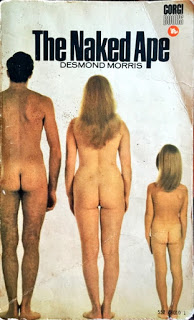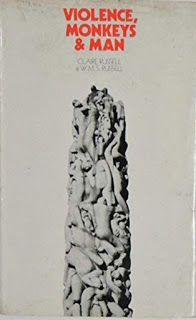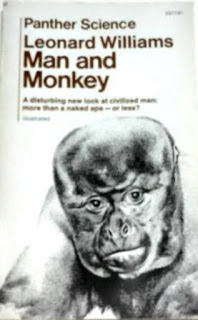Man: Ape in Wolf’s Clothing?
 Perhaps the most famous of scientific frauds was the fake Piltdown Skull of 1910, a “missing link” fabricated by a person unknown. That anonymous joker put together an ape’s jaw with a human skull. Desmond Morris has grafted the most ignorant fairy tales about human society onto a body of basically sound ideas about human biological evolution. The Naked Ape is a barefaced hoax.
Perhaps the most famous of scientific frauds was the fake Piltdown Skull of 1910, a “missing link” fabricated by a person unknown. That anonymous joker put together an ape’s jaw with a human skull. Desmond Morris has grafted the most ignorant fairy tales about human society onto a body of basically sound ideas about human biological evolution. The Naked Ape is a barefaced hoax.
As a gimmick, Morris pretends to describe the human animal just as it would be pictured by a zoologist if it were a newly-discovered species. “Naked ape” is a clinical term (like “black-footed squirrel”) which is supposed to denote men’s most noticeable characteristics: their lack of fur. But evidently, Morris has become arich man because to millions of his readers, nudity is a novelty. It should be obvious that the most important thing about human animals is not that they are naked, but that they are clothed. In other words, they produce what they consume; they turn the artificial into the necessary, and (like Morris) sometimes confuse it with the natural.
His book is a hymn of praise to modern capitalism. All the current practices, preoccupations, superstitions, myths and manners are, according to Morris, highly admirable. Furthermore, they are natural because they stem from man’s past as a wolf-like, monogamous, predatory killer. Frequently this approach becomes so manifestly silly that we are tempted to suspect the author of perpetrating a spoof, a sarcastic attack on the ludicrous legends of human nature:
“One of the essential features of the hunt is that it is a tremendous gamble and so it is not surprising that gambling, in the many stylised forms it takes today, should have such a strong appeal.”
We can safely wager that not one of the fish-eyed zombies who stand for hours in front of a fruit machine has yet thought of defending his addiction with the excuse that it stems from the bloodthirsty excitement of his prehistoric past.Derision is the only intelligent response to this sort of foolishness, yet Morris seems to be serious. Anyone with a smattering of education knows that societies have changed historically, and that customs vary geographically. But according to Morris, only capitalist man is truly human:
“The earlier anthropologists rushed of to all kinds of unlikely corners of the world in order to unravel the basic truth about ournature, scattering to remote cultural backwaters so atypical and unsuccessful that they are nearly extinct. They then returned with startling facts about the bizarre mating customs, strange kinship systems, or weird ritual procedures of these tribes, and used this material as though it were of central importance to the behaviour of our species as a whole. The work done by these investigators was, of course, extremely interesting and most valuable in showing what can happen when a group of naked apes become sidetracked into a cultural blind alley. It revealed just how far from the normal our behaviour patterns can stray without a complete social collapse. What it did not tell us was anything about the typical behaviour of typical naked apes. This can only be done by examining the common behaviour patterns that are shared by all the ordinary, successful members of the major cultures – the mainstream specimens who together represent the vast majority. Biologically this is the only sound approach.”
In other words, don’t talk to me about filthy savages. Of course, biology has nothing to do with it. There is no evidence that different cultures are due to different biological endowments, and plenty of conclusive evidence against this. People from “all kinds of unlikely corners of the world” have been educated to be perfectly competent under advanced capitalism. Sometimes, even, the more backward the better: as in many parts of Africa, where people from stateless societies (such as the Ibo) have caught on to capitalist values much quicker than people from near-feudal societies at a more advanced stage of social evolution. For that matter, it is common knowledge that the peoples in the most advanced societies today (the Anglo-Saxons, Japanese, Russians, etc.) were for thousands of years scattered in “remote cultural backwaters” while highly successful empires sprouted in what are now wretched deserts. Morris would be very contemptuous about the “bizarre mating customs, strange kinship systems, or weird ritual procedures” of his European ancestors of 2000 years ago.
Tightly blinkered
Not that he is a racist. His point is that “the characteristics that the earlier anthropologists studied in these tribes may well be the very features that have interfered with the progress of the groups concerned”. But to say this is to gloss over the weak point in his argument. If the development of civilisation has been social and not biological, then why stop the clock at one point in time and say that this particular stage of society corresponds to an inborn pattern? Is it not clear, instead, that man is capable of a very wide range of cultural behaviour, and that the modern set of conventions in marriage and politics is just one of many, all equally compatible with any of man’s inborn characteristics?
Not to Morris. He constantly refers to his society as “mainstream”, “healthy”, “go-ahead”, “natural”, and “typical”. His reasons for this judgement are mainly two: that capitalism has the biggest population, and that “the naked ape is essentially an exploratory species.” Morris is thus a typical example of an individual tightly blinkered by the capitalist system, inside which he has been brought up. It never occurs to him that his own value judgement in placing a massive population and an exploratory drive above all other considerations is itself a result of social conditioning. It would seem to him extremely “bizarre”, “strange”, “weird”, and “typical” to judge a society by (for instance) whether its population is happy, or whether its exploratory drives are harnessed to the satisfaction of human needs. He cannot avoid recognising the danger of capitalist war:
“We are, to put it mildly, in a mess, and there is a strong chance that we shall have exterminated ourselves by the end of the century.”
And, as one whose mind is open to every myth and delusion in popular circulation, Morris believes that there is a danger of world “overpopulation”, so it might seem surprising that he should consider a large population the primary badge of success. But hehas an answer for this:
“It looks verymuch as though, during the next century or so, weare going to have to change our sexual ways at last. But if we do, it will not be because they failed, but because they succeeded too well.”
Therefore, although the 20th-century predator is a marvellous piece of work (Morris claims his approach isn’t a moral one, but his strong approval shines through every page), the writer can have it both ways. We are a tremendous success because of our animal nature; our colossal failure is due to our animal nature. He has further room for manoeuvre in man’s twofold origin: that of a vegetarian primate which descended from the trees and became a hunter. Anything which cannot be “explained” by man’s predatory nature can of course be quietly slotted into his primate nature. Morris’s strategy is to assume that all modern man’s behaviour is caused by his “nature”, then to look into the current theories of man’s evolutionary origins for the most plausible tie-ups with his present-day activities. Naturally they can easily be found, and this approach then becomes circular, “proving” itself. Since Morris is quite good on biology, his obvious expertise in this field seems to give his elfin portrayal of society some authority. It is awidespread superstition that an expert in one field carries some weight in all fields, and Dr. Morris has exploited this to the full. Latter-day Original Sin merchant Robert Ardrey was overjoyed to find some apparently scientific support for his utterly discredited “Man the Killer” fantasies, and commented on The Naked Ape: “This spectacular book by a master scientist is what every naked ape has been waiting for.”
Dislike of facts
Actually Morris is more than just a specialist who imagines the universe is part of his speciality. He, along with Ardrey and Lorenz, is part of a very definite “backlash” against social science. The problem is that modern sociology and social anthropology, even though sponsored by the capitalist state, have proved up to the hilt what socialists have long insisted: that man’s most sacred institutions are not the product of his nature, but of his changing social environment. There is a very powerful and widespread dislike of this well-substantiated (and rather elementary) fact, which manifests itself in a strong appetite for the output of anyone who can undertake to “prove” the opposite. Anthony Storr wrote in the Sunday Times recently:
“One quite certain principle of sociology is that very little, if any, human behaviour is inherited”. This extraordinary statement must arise from the idea that man is perfectible by altering his social institutions: a delusion to which only very old-fashioned Communists can now subscribe. We know very little about the fundamental patterns of human behaviour, but we know enough to be sure that man is not infinitely adaptable, and that we neglect biological factors at our peril.
This passage bristles with interesting details: Storr’s coy recognition of the apologetic political function his views serve, the meaningless but ominous-sounding “neglect biological factors at our peril”, the casual admission that “very little” is known about the subject of his heated denunciation, the unjustified use of the alarm-word “extraordinary”, and amid this wordy dust-storm, the one definite statement: that man is not “infinitely adaptable”, which no-one ever suggested.
Actions learned
At the risk of labouring the obvious, let us point out that all of man’s behaviour results from a combination of environmental and genetic factors; that man is the most adaptable of all animals all his deliberate actions are learned; that historically and geographically societies have varied very greatly in their systems of marriage, leadership (if any), property, religion (if any), and status, and that these diversities are not due to genetic differences; that to call any of these systems innate is exactly as ridiculous as to say that the grammar of the English language is innate.
The very fact that the whole human species has spent a very brief period of time (a few centuries) in Morris’s “mainstream”, while it spent the vast majority of its career (many tens of thousands of years) much closer to his “remote cultural backwaters”, should dispel any notion that capitalism’s conventions are inborn. But on one point we agree with Morris. Capitalism is the most advanced system the world has ever seen. For our part, however, this not a moral judgement. On the contrary, capitalism appeared upon the scene drenched in blood from head to foot; it sent its hideous scourges, Jesus and VD, into all “remote cultural backwaters”, as the advance guard of murder, pillage, and profit. Under capitalism, genocide has become commonplace; misery the very air we breathe.
But when we say that capitalism is the most advanced social system, we mean that its potential for satisfying human needs is greater than that of any previous order. Capitalism is still a tremendously dynamic society, a society of unparalleled achievement, but of unparalleled waste and destruction also. Only Socialism can put the “exploratory urge” of capitalism to the service of human happiness.
The Naked Ape does contain some well-established facts, and some reasonable speculations (though even the zoological data cannot be entirely relied upon. Some of Morris’s sweeping generalisations about sex in non-human primates are falsified by Leonard Williams’ observations of woolly monkeys). Furthermore, even in 1969, many workers still have a religious, sentimental view of man, refusing to believe that everything about human beings can be explained scientifically. The book may therefore do a good job here, in stripping away mystery and confusion.
Monkey myths
 Violence, Monkeys and Menby Clare and W. M. S. Russel explains itself at the outset:
Violence, Monkeys and Menby Clare and W. M. S. Russel explains itself at the outset:
“First, wehave tried to show that violence is not the result of an innate propensity to aggression irrespective of conditions, but a response to stress in societies. Second, we suggest that violence is part of a complex of responses evolved to achieve drastic reduction of a population thatis in danger of outgrowing its resources.”
Here we have the familiar Malthusian view of human violence, linked up with observations of the behaviour of overcrowded captive monkeys. The main error is the confusion of overpopulation with overcrowding. In the world today there is plenty of overcrowding but no overpopulation: the general trend is the depopulation of some areas, together with the cramming of large masses of people into gigantic cities. There is plenty of room in the world.
Overcrowding does place terrible strains on workers, leading to outbursts of violence, but these must be seen in association with all the other oppressive features of life inside capitalism.
Interesting is the summary of research into monkey violence. In 1932 Zuckerman published The Social Life of Monkeys and Apes, based on observations of baboons in Regent’s Park:
“The notion of violent aggressiveness as an inherent quality of monkeys (or at least of baboons) was impressed upon a generation of scientists. By the fifties, when the crime returns from the affluent societies began to hit the headlines. the apparent results of Zuckerman’s work may well have influenced a wider public, and helped to bring about the resurgence of the unconditional view of aggression. Alike in monkeys and man, it seemed, the improvement of living conditions is no guarantee against violence; aggressiveness is human nature, monkey nature, a fact of nature in the most fundamental sense.”
Only in recent years have researchers begun to study apes and monkeys in the wild, though they have done so with their heads full of prevailing capitalist myths about “human nature” and hence “monkey nature”. These scientists have been astonished at the peaceable behaviour of wild monkeys, and at first tried to write it off as exceptional or “unusual”, but they have finally had to face the unpalatable fact that healthy monkeys and apes in the wild hardly ever fight.
The author’s conclusion is that “all monkeys are peaceful in some conditions, and violently aggressive in others. Violence is a property of mammalian societies exposed to stress.” They apply this to human beings, and refute the theory (held by Morris) that man’s nature has been predominantly moulded bya wolf-like hunting experience. For by far the greater part of the evolution of man’s ancestors, after they came down from the trees, it would be truer to term them “scavengers” rather than “hunters”. In any case, adaptation to a hunting life would not necessarily make any creatures more aggressive within their own society,
Man and Monkey by Leonard Williamsis a strange book: an idiosyncratic account  of the author’s relations with woolly monkeys, combined with a theory of history and society which is a mish-mash of undigested bits of Hegel, Freud, Nietzsche, Lorenz and, yes, Marx. Here we see again the naked ape syndrome, of mixing up half-baked, gossipy opinions with hard facts, in the hope that the latter will add some conviction to the former. A couple of samples: “We are all agreed that the fate of humanity depends on whether the strength of morality can cope with the instinctive drives of man.” “History shows that aggressive races possessed more initiative and energy than their passive neighbours.” Williams generally does reach opposite conclusions to those of Morris: he finds modern life profoundly unnatural.
of the author’s relations with woolly monkeys, combined with a theory of history and society which is a mish-mash of undigested bits of Hegel, Freud, Nietzsche, Lorenz and, yes, Marx. Here we see again the naked ape syndrome, of mixing up half-baked, gossipy opinions with hard facts, in the hope that the latter will add some conviction to the former. A couple of samples: “We are all agreed that the fate of humanity depends on whether the strength of morality can cope with the instinctive drives of man.” “History shows that aggressive races possessed more initiative and energy than their passive neighbours.” Williams generally does reach opposite conclusions to those of Morris: he finds modern life profoundly unnatural.
One very clear conclusion from both Violence, Monkeys and Man and Man and Monkey is the horribly cruel treatmentof our cousins the apes and monkeys, both in zoos and in the pet trade, in the interests of profit.
